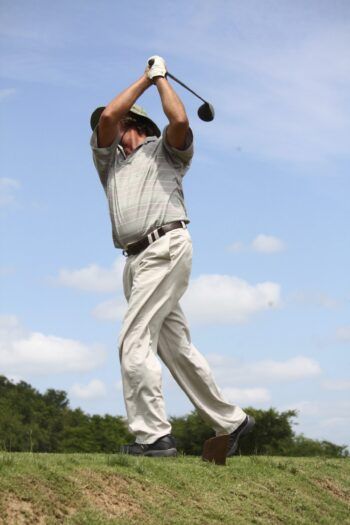
Getting Your Swing Back After a Golf Injury
Getting Your Swing Back After a Golf Injury
We typically think of golf as one of the more relaxing sporting pastimes—you can take things at a leisurely pace, enjoy the fresh air and views of rolling greens, and even hop on the trusty golf cart if you don’t feel like walking the whole course. Assuming you don’t get beaned by a stray ball or trip in a hole, chances are good that you’ll return home unscathed. However, without proper technique and awareness of potential injury caused by the repetitive motions involved in your golf swing, the long-term impact of this relaxing hobby can be anything but sunny!
A proper golf swing requires the synchronized effort of muscle strength, timing, and coordination to generate club-head speeds of up to 100 mph. That equals a lot of oomph, meaning there can be potential for injury over time. While golf injuries usually affect the elbow, wrist, shoulder, and the lumbar area of the back, the most common injuries are shoulder problems. These typically affect the “lead” shoulder opposite your dominant hand and may include injuries to the long head of the bicep tendon, shoulder impingement, osteoarthritis, shoulder joint instability, and most commonly, rotator cuff tears.
Golf and Rotator Cuff Injuries
While traumatic rotator cuff tears typically result from a fall or a heavy lift, tears may also occur due to gradual degeneration from stressful overuse. The intense shoulder motions that power your golf swing also put a great deal of stress on the muscles, tendons, and connective tissues that enable shoulder rotation, of which the rotator cuff is the most important.
The rotator cuff—technically an entire network of muscles—connects your upper arm to your shoulder blade. The repetitive, intense stress of golf activity can cause a partial tear or even completely sever the rotator cuff from the bone.
Possible Treatment Options
Millions of people suffer from rotator cuff tears each year, and the majority can be successfully and sufficiently treated with non-surgical methods, including a combination of these options:
● RICE (rest, ice, compression, and elevation)
● Activity modification to reduce stress and allow healing (this may mean a break or long-term cessation of golf activity)
● Physical therapy and rotator cuff exercises to strengthen the damaged muscle and connective tissues
● Anti-inflammatory medications to relieve swelling and inflammation
● Cortisone and steroid injections
In some cases, though, surgery will be the most effective treatment option. In particular, surgery is often recommended if you’ve had a complete tear or intend to return to regular, high-impact activity, including frequent or competitive golf activity.
The goal of rotator cuff surgery is to reattach the torn tendon to the top of the humerus bone. The operation may be performed in one of three ways: through a traditional open incision, using a mini-incision (typically three to five inches in width) or arthroscopically, using a miniature camera and surgical tools.
If you have been diagnosed with or think you may have a rotator cuff injury due to golf activity, the necessary next step is orthopaedic treatment that can provide long-term relief from painful symptoms and enable you to come back to your golf game full swing. Working with a specialized practice like DOC Orthopaedics and Sports Medicine in Decatur and Hartselle, you can take advantage of the expertise of our 10 providers as part of our multidisciplinary musculoskeletal practice.
Since 1972, DOC Orthopaedics and Sports Medicine has been committed to providing exceptional orthopaedic care through innovative techniques, quality services, patient communication and education. With specialties ranging from general orthopaedics and physical therapy to sports medicine, joint replacement and more, the doctors at DOC Orthopaedics and Sports Medicine can provide local expert care for any orthopaedic disorder or injury and help put your life back in motion.

